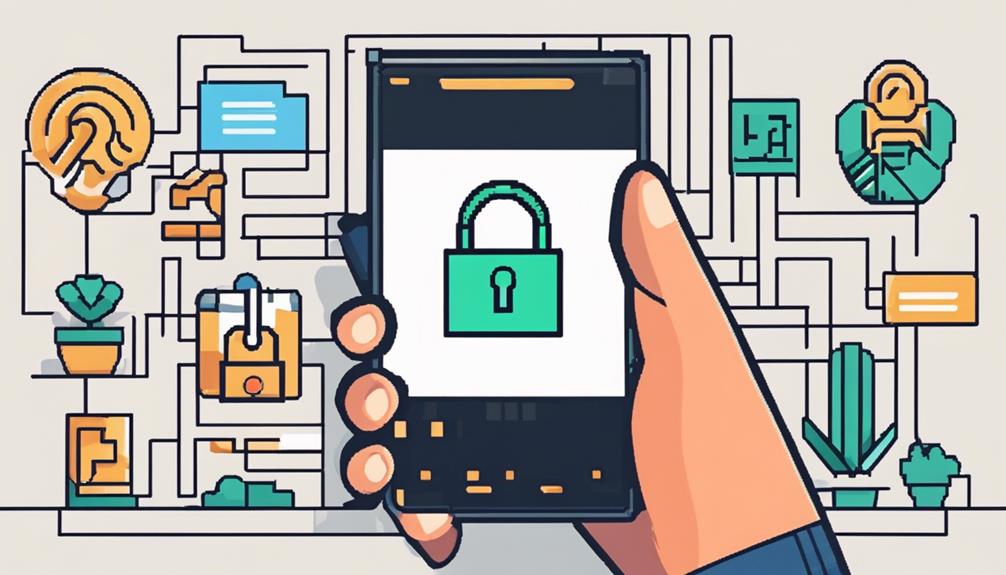To safeguard your Android phone from hackers, prioritize these key tips: First and foremost, secure your phone with a robust lock screen, strong passcode, and biometric authentication. Next, make sure to regularly update your software for enhanced security. In addition, practice safe app downloads; stick to official stores, review permissions, and be cautious with free apps. Also, remember to back up your data regularly using services like Google Drive and enable remote wipe features. Finally, use multi-factor authentication to add an extra layer of security, and consider using a VPN for encrypted internet connections. These measures will help protect your device and personal information effectively.
Key Takeaways
- Set a strong lock screen passcode or pattern.
- Regularly update your Android phone's software.
- Be cautious with app downloads, stick to official stores.
- Backup data regularly and enable remote wipe features.
- Implement multi-factor authentication and use a VPN.
Secure Lock Screen Options
Implementing robust lock screen measures is vital in safeguarding your Android phone against unauthorized access. Set up a strong passcode or pattern that is not easily guessable to enhance security.
Consider using biometric authentication methods like fingerprint or facial recognition for added protection, as they are harder to replicate.
Enable remote locking and wiping features on your device to prevent unauthorized access in case your phone is lost or stolen. These features allow you to remotely lock the phone or erase its data to keep your information secure.
It is essential to regularly update your Android phone's software to patch security vulnerabilities and protect against potential threats. By staying up to date with software updates, you make sure that your phone has the latest security patches and enhancements to keep your device and data safe from hackers.
Regular Software Updates

To guarantee the ongoing security of your Android phone, prioritizing regular software updates is vital. Android updates are not only essential for enhancing performance and introducing new features but also for protecting your personal data, passwords, and sensitive information.
These updates include security patches that address known vulnerabilities, safeguarding your device against potential hacking attempts and malware attacks. Delaying or ignoring software updates can leave your Android phone exposed to security risks, compromising its integrity and putting your data at risk.
App Download Best Practices

Ensuring the security of your Android phone starts with practicing smart app download habits. Stick to official app stores like Google Play Store to secure your device against malicious software.
Before downloading any app, review the permissions it requests to prevent unnecessary access to your personal data. Exercise caution with free apps and subscription services as they can pose privacy risks.
Avoid downloading from untrusted sources to minimize the chances of exposing your Android phone to security vulnerabilities. Apps from unofficial sources may lead to data breaches and compromise your device's security.
By being mindful of where you download apps from and understanding the potential risks, you can take proactive steps to safeguard your Android phone against hackers and protect your personal information.
Always prioritize your privacy and security when choosing which apps to download to maintain a secure digital environment on your device.
Data Backup and Remote Wipe

Regularly backing up your Android phone is crucial for safeguarding your data and guaranteeing quick recovery in case of hacking or theft. By utilizing services like Google Drive or other cloud platforms, you can securely back up important data such as contacts, photos, and documents, minimizing the impact of a security breach on your device.
Enabling the 'Find My Device' feature on your Android phone allows you to remotely locate, lock, or erase your device if it gets lost or stolen. In addition, third-party apps like Cerberus or Prey offer the capability to remotely wipe your phone in case of a security compromise.
Setting up automatic backups not only provides peace of mind but also ensures quick access to your data during emergencies. By taking these proactive steps to back up your Android phone and enable remote wipe features, you can protect yourself from potential data loss and unauthorized access, giving you added security and control over your device.
Multi-Factor Authentication and VPNs

Enhancing the security of your Android phone involves implementing multi-factor authentication and utilizing a reliable VPN. Two-Factor Authentication adds an extra layer of protection, requiring a second form of verification beyond just a password, thereby reducing the risk of unauthorized access and potential data breaches.
By enabling this feature on your Android phone, you can greatly enhance security and safeguard your personal information from hackers.
Additionally, using a VPN on your Android device encrypts your internet connection, ensuring that your data remains secure, especially when connected to public Wi-Fi networks. VPNs play an important role in protecting your online privacy and preventing cybercriminals from intercepting sensitive information, ultimately decreasing the risk of identity theft and unauthorized access to your device.
Frequently Asked Questions
How Do I Make My Android Phone More Secure?
To enhance the security of your Android phone, utilize biometric authentication, update your device and apps regularly, download apps only from trusted sources, employ a VPN on public Wi-Fi, and consider installing antivirus software for robust malware protection.
Can I Stop My Phone From Being Hacked?
To prevent hacking attempts on your Android phone, prioritize security measures such as strong passwords, biometric authentication, regular updates, cautious app usage, two-factor authentication, and VPN usage on public Wi-Fi networks. These steps enhance protection against unauthorized access and data breaches.
Can Hackers Access Your Android Phone?
Are hackers able to infiltrate your Android phone? Unfortunately, yes. Through various means like malware, phishing, and software vulnerabilities, hackers can access personal data, financial information, and even take control of your device remotely.
How Do I Make My Android Phone Theft Proof?
To make your Android phone theft-proof, enable Find My Device for tracking and remote control. Set up a secure screen lock with PIN, pattern, password, or biometrics. Avoid rooting, install antivirus software, and regularly update the OS and apps for enhanced security.
Conclusion
To sum up, keeping your Android phone safe from hackers requires implementing secure lock screen options, regularly updating software, practicing safe app downloads, backing up data, utilizing multi-factor authentication, and using VPNs.
Remember, just as you lock your front door to protect your home, taking these steps will help safeguard your personal information and prevent unauthorized access to your device.
Stay vigilant and proactive in protecting your Android phone from potential cyber threats.









